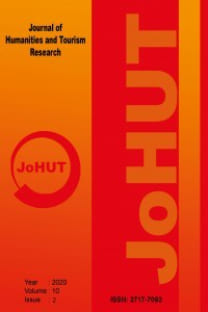A Holistic View on Contemporary Art Museums in the Context of Accessible Tourism - Case Studies from Central Europe
The issues for the societies where all people live and receive service equally without discrimination, are growing rapidly nowadays in the world and also studies in Accessible Tourism (Tourism for All) are carried out on this principle, too. According to World Health Organization 15% of the world's population is disabled. Disability is now accepted as an “umbrella term”, covering impairments, activity limitations, and participation restrictions. New definition of disability including temporary obstacles (new age diseases, pregnancy, aging, etc) has changed the size of target audience. In addition, the integrity of the tourism chain, which consists of accessible information, accessible transportation, accessible infrastructure and accessible service, has removed Accessible Tourism from niche market. As an innovative and human-centered design, which serves tourism and cities, Contemporary Art Museum topic has become attractive for persons with disabilities who have increased opportunities to participate in life around the world. It is especially important that these museums have to be accessible and inclusive to serve the public on equal terms. Because the dialogue of contemporary art museums with today's society, distinguishes them from other museums via awareness, interpretation, feedback and interactive education (public programs) and takes the program beyond the building and collection. The aim of this study is; to generate ideas about building and urban programming for national museums in the light of analysis of the museology practices in Europe considering accessible tourism. Within the scope of the study, accessible tourism practices in Vienna, Budapest and Prague were examined, and case studies were applied on contemporary / modern art museums selected in those cities. Physical accessibility of the museums was evaluated according to the Access-audit forms and supported by visual records. After the synthesis of the obtained data, comparative analyzes were done based on accessible tourism principles. This study will provide a comprehensive overview about Museum for All via integrating single building with the urban scale in the light of the Universal Design Principles beyond listing limited current accessibility information about selected museums.
Anahtar Kelimeler:
Tourism for All, Accessible Tourism
___
- Access City Award (2018) 5 Aralık 2018 tarihinde https://ec.europa.eu/social/main.jsp?langId=en&catId=1141&eventsId=1208&furtherEvents=yes adresinden erişildi. Accessibility Brochure for Prague 5 Aralık 2018 tarihinde https://www.prague.eu/file/edee/universal/download/brozury/prochazky-bez-barier/4ppbezbarier_en.pdf adresinden erişildi. Accessible Britain 5 Aralık 2018 tarihindehttps://www.visitbritain.com/us/en/plan-your-trip/getting-around-britain/accessible-britain adresinden erişildi. Accessible Prague web site 5 Aralık 2018 tarihinde http://www.accessibleprague.com/index.html adresinden erişildi. Accessible tourism definition, European Commission 5 Aralık 2018 tarihinde http://ec.europa.eu/growth/sectors/tourism/offer/accessible_en adresinden erişildi. Accessible Vienna 5 Aralık 2018 tarihinde https://www.wien.info/en/travel-info/accessible-vienna adresinden erişildi. Ambrose T. & Paine C. (1993). Museum Basics, ICOM, Routledge, Great Britain. ENAT Accessible cities list 5 Aralık 2018 tarihinde http://www.accessibletourism.org/?i=enat.en.accessible-cities adresinden erişildi. Enlil, Z., Dinçer, İ., Evren, Y., Seçkin E. (2011). "Innovative Strategies for Cultural Tourism in Istanbul". Istanbul Bilgi University Press. Horner, S., & Swarbrooke, J. (2004). International cases in tourism management. Amsterdam: Elsevier ITB (2012/2013). ITB world travel trends report. [5 Aralık 2018 tarihinde http://www.itbberlin.de/media/itbk/itbk_media/itbk_pdf/WTTR_Report_2013_web.pdf] adresinden erişildi. Lorente, P. (2011). Çağdaş Sanat Müzeleri, (Şeyda Öztürk Çev.), Koç Üniversitesi, İstanbul. Ludwig Museum Official site – History 5 Aralık 2018 tarihinde https://www.ludwigmuseum.hu/en/history-0 adresinden erişildi. Ludwig Museum Official site – Location- getting here- 5 Aralık 2018 tarihinde https://www.ludwigmuseum.hu/en/location-getting-here adresinden erişildi. Lundgaard, I., B. (2014). Museums Social Learning spaces And Knowledge Producing Processes, Slos-og Kulturstyrelsen. MOMA (2018). official web site, visit accessibility : https://www.moma.org/visit/accessibility/ Mumok official web site 5 Aralık 2018 tarihinde https://www.mumok.at/en adresinden erişildi. Paris guide, Official website of the Convention and Visitors Bureau 5 Aralık 2018 tarihinde https://en.parisinfo.com/practical-paris/visiting-paris-with-a-disability/accessible-paris-guide adresinden erişildi. Recommendation concerning the Most Effective Means of Rendering Museums (1960)Accessible to Everyone 5 Aralık 2018 tarihinde http://portal.unesco.org/en/ev.php-URL_ID=13063&URL_DO=DO_TOPIC&URL_SECTION=201.html adresinden erişildi. Sage traveling - The European Disable Travel Experts 5 Aralık 2018 tarihinde https://www.sagetraveling.com/about adresinden erişildi. UNESCAP (2009).Takayama Declaration – Appendix 5 Aralık 2018 tarihinde http://www.accessibletourism.org/?i=enat.en.faq.744 adresinden erişildi. Universal Design definition: Ron Mace, The Center for Universal Design NC State University College of Design 5 Aralık 2018 tarihinde https://projects.ncsu.edu/design/cud/about_ud/about_ud.htm) adresinden erişildi. Visit Barcelona 5 Aralık 2018 tarihinde https://www.barcelonaturisme.com/wv3/en/ adresinden erişildi. World Report On Dısabılıty: World Health Organization (2011) 5 Aralık 2018 tarihinde http://www.who.int/disabilities/world_report/2011/en/ adresinden erişildi.
- ISSN: 2717-7092
- Başlangıç: 2010
- Yayıncı: Karabük Üniversitesi
Sayıdaki Diğer Makaleler
Investigation of the Alcohol Usage Habits of University Students by Logistic Regression Analysis
Taner ERSÖZ, Gizem KAPANŞAHİN, Filiz ERSÖZ
Recâizade Mahmut Ekrem'in Yazdığı Bir Takrîz Örneği: İdes'e Takrîz
Yerel Kalkınmada Üniversite-Kalkınma Ajansı İşbirliği: Türkiye (İzmir) Örneği
Philosophical Arabesques / Felsefi Arabesk
Türkiye’de Reel Efektif Döviz Kuru, İhracat ve İthalat Arasındaki Nedensellik İlişkisinin Analizi
Aygül ÖZYILDIRIM, Cenk Murat KOÇOĞLU
Firmaların Kurumsal Yönetim Notunu Etkileyen Unsurlar: BİST 100 Örneği1
